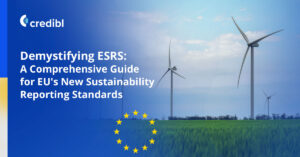ESG factors, also known as environmental, social, and governance factors, are becoming increasingly important in investment decision-making. ESG factors are a set of criteria that investors use to evaluate companies based on their environmental impact, social responsibility, and corporate governance practices.
In the past, investment decisions were based primarily on financial factors such as profitability, return on investment, and market share. However, in recent years, investors have started to recognize the impact of ESG factors on the long-term performance of companies and investment portfolios. The COVID-19 pandemic has accelerated the trend towards sustainable investing, with 81% of institutional investors surveyed by Morgan Stanley saying that they believe companies with strong ESG practices are more resilient in times of crisis. This recognition has led to a growing interest in integrating ESG factors into investment decision-making.
The importance of considering ESG factors in investment decisions is twofold. Firstly, companies that are proactive in managing ESG risks and opportunities are more likely to succeed over the long term. By taking into account ESG factors, investors can identify companies that are well-positioned to meet future challenges and deliver sustainable growth.
Secondly, investors are becoming more aware of their investments’ impact on the world around them. They are increasingly interested in investing in companies that align with their values and beliefs. By considering ESG factors, investors can ensure that their investments are aligned with their values and have a positive impact on society and the environment.
ESG factors include:
Environmental Factors: These factors refer to a company’s impact on the natural environment. This can include factors such as Carbon emissions, energy efficiency, water usage, waste management, and biodiversity conservation. Investors may look for companies that have strong environmental policies and practices, such as reducing their carbon footprint, using renewable energy sources, and implementing sustainable resource management practices.
Social Factors: Social factors refer to a company’s impact on society and can include labor practices, human rights, diversity and inclusion, product safety, and community engagement. Investors may look for companies that have strong social policies and practices, such as fair labor standards, and a commitment to diversity and inclusion.
Governance Factors: Governance factors refer to a company’s internal management practices, including its board of directors, executive compensation, and shareholder rights. Good governance practices can help ensure that a company is well-managed and can minimize risks related to fraud or mismanagement. Investors may look for companies that have strong governance practices, such as transparent financial reporting, independent boards, and appropriate executive compensation.
Why integrate ESG Factors in Investment Decisions?
Integrating ESG factors into investment decision-making can offer several benefits for investors. Here are some reasons why more investors are considering ESG factors when making investment decisions:
- Enhanced long-term performance: Companies that have strong ESG practices are more likely to deliver sustainable, long-term financial performance. By considering ESG factors, investors can identify companies that are well-positioned to meet future challenges and deliver sustainable growth.
- Risk management: ESG factors can help investors identify companies that may be exposed to risks related to environmental, social, and governance issues. For example, companies with poor environmental practices may be exposed to increased regulatory risks, while those with poor social practices may face reputational risks.
- Positive impact on society and the environment: Investors can use their investments to support companies that align with their values and have a positive impact on society and the environment. Investing in companies with strong ESG practices can help drive positive change and contribute to a more sustainable future.
- Regulatory compliance: Governments around the world are introducing new regulations that require companies to report on their ESG practices. By considering ESG factors, investors can ensure that their investments comply with these regulations.
In addition to these benefits, studies have shown that integrating ESG factors into investment decision-making can have a positive impact on investment performance. For example, Global sustainable investment assets reached $35.3 trillion at the start of 2020, up 15% from 2018, according to the Global Sustainable Investment Alliance (GSIA). In the United States, sustainable investing assets under management grew from $12 trillion in 2018 to $17.1 trillion in 2020, a 42% increase, according to the US SIF Foundation’s 2020 biennial report. In Europe, sustainable investment funds attracted record inflows of €233 billion ($279 billion) in 2020, according to Morningstar.
How to Integrate ESG Factors in Investment?
Integrating ESG factors into investment decision-making can seem like a daunting task, but it doesn’t have to be. Here are some steps that investors can take to incorporate ESG factors into their investment decision-making process:
- Define investment goals: Start by defining your investment goals and how ESG factors fit into your overall investment strategy. Consider what ESG factors are most important to you, and how they align with your investment goals.
- Evaluate ESG factors: Next, evaluate companies based on their ESG performance. This can involve reviewing company reports, news articles, and other sources of information. Look for companies that have strong ESG practices that align with your investment goals.
- Use ESG ratings: ESG ratings can be a helpful tool for evaluating companies’ ESG practices. These ratings can help investors quickly assess a company’s ESG performance and identify areas for improvement.
- Integrate ESG factors into investment analysis: When analyzing potential investments, incorporate ESG factors into your analysis. Consider how a company’s ESG practices may impact its long-term financial performance, and how it compares to its peers in terms of ESG performance.
- Monitor Portfolio Alignment: Once you’ve invested in companies based on their ESG performance, monitor their ongoing ESG performance with a portfolio alignment platform like Credible ESG for Fund Managers. Regularly review their reports and other sources of information to ensure they continue to meet your ESG criteria.
In conclusion, investors should consider integrating ESG factors into their investment decision-making process to achieve their long-term investment goals and contribute to a more sustainable future. By using the steps and tools outlined in this blog post, investors can successfully integrate ESG factors into their investment process and contribute to a better world for all.
Credible offers an end-to-end ESG portfolio alignment solution that provides in-depth ESG impact analysis of investee companies, and extensive reporting based on ESG frameworks like TCFD, SASB, GRI, and more. Credible ESG for Fund Managers will help fund managers better integrate ESG considerations into their investment process, improve risk management, meet investor demands, enhance sustainability performance, and gain a competitive advantage.







